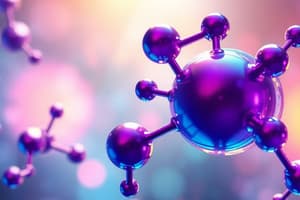Podcast
Questions and Answers
What is the primary focus of organic chemistry?
What is the primary focus of organic chemistry?
- Analyzing noble gases
- Exploring carbon-based molecules (correct)
- Investigating the properties of metals
- Studying inorganic compounds
Why is carbon considered central in organic chemistry?
Why is carbon considered central in organic chemistry?
- It is a noble gas
- It can form up to three covalent bonds
- It is the most abundant element in the universe
- Its ability to form four covalent bonds and create complex molecular networks (correct)
What are functional groups in organic chemistry?
What are functional groups in organic chemistry?
- Segments of a molecule that are purely decorative
- Regions in a compound with characteristic reactivity patterns (correct)
- Areas where metals are concentrated
- Specific locations where isotopes are found
Which of the following is NOT an example of a functional group?
Which of the following is NOT an example of a functional group?
What type of bond does carbon typically form in organic molecules?
What type of bond does carbon typically form in organic molecules?
What do reactions in organic chemistry involve?
What do reactions in organic chemistry involve?
What type of reaction involves the formation of a new sigma bond from an electrophile and a pi bond?
What type of reaction involves the formation of a new sigma bond from an electrophile and a pi bond?
Which spectroscopy technique is commonly used to detect C-H stretching and O-H bending in molecules?
Which spectroscopy technique is commonly used to detect C-H stretching and O-H bending in molecules?
What practical outcome of organic chemistry involves the synthesis of drugs like aspirin and morphine?
What practical outcome of organic chemistry involves the synthesis of drugs like aspirin and morphine?
Which field benefits from the applications of polymers developed through controlled polymerization processes?
Which field benefits from the applications of polymers developed through controlled polymerization processes?
What is the primary purpose of using biodegradable polymers in environmental applications?
What is the primary purpose of using biodegradable polymers in environmental applications?
Why is organic chemistry considered foundational for scientific breakthroughs?
Why is organic chemistry considered foundational for scientific breakthroughs?
Flashcards are hidden until you start studying
Study Notes
Exploring Organic Chemistry's World of Carbon-Based Molecules
Organic chemistry is a vibrant field within chemical sciences that focuses primarily on carbon-based molecules, their reactions, properties, and applications. These compounds form the backbone of life itself – from the intricate structures of DNA and proteins to familiar everyday materials like plastics and pharmaceuticals. Let's delve deeper into this fascinating realm where atoms dance together under the guidance of molecular bonds.
Centrality of Carbon
Carbon stands out among elements due to its unique ability to form four covalent bonds through hybridization of atomic orbitals allowing it to create complex and diverse molecular networks. This central role led chemists to name the discipline studying these structures 'organic,' since many of them were initially found in living organisms.
Key Concepts in Organic Chemistry
Some essential concepts you will encounter while exploring organic chemistry include:
-
Functional groups: Distinct regions of a compound with characteristic reactivity patterns derived mainly from specific electron arrangements around a core atom.
- Examples: Alkyl halides (-X), alcohols (-OH), alkenes (C=C), benzene rings (aromatic ring with alternating single and double bonds)
-
Reactions: Transformations between different functional groups leading to new molecules with altered structure and function.
- Examples: Nucleophilic substitution (SN2, SN1), electrophilic addition (electrophile + pi bond → new sigma bond), elimination reactions (e.g., dehydrohalogenation)
-
Spectral methods: Techniques used to analyze molecular properties via interaction with electromagnetic radiation (light):
- Infrared spectroscopy detecting C-H stretching, O-H bending, and other functional group vibrations
- Ultraviolet–visible spectroscopy measuring absorption by chromophores such as aromatic systems
- Mass spectrometry determining molecular weight and fragmentation pattern
Applications of Organic Chemistry
This fertile area of science has produced numerous practical outcomes across various fields:
-
Synthesis of drugs: Many natural products and drugs originate from organic compounds extracted from plants and animals. For example, aspirin and morphine come from salicylic acid and opium poppy respectively.
-
Material science: Polymers developed using controlled polymerizations (such as emulsion or free radical processes) have found wide application in packaging, textiles, and coatings industries.
-
Environmental applications: Biodegradable polymers serve as alternatives to non-biodegradable synthetic materials causing pollution issues.
In summary, organic chemistry provides us with a wealth of knowledge and opportunities stemming from our understanding of carbon-based molecules. Whether we work towards discovering new medicines, developing innovative materials, or finding solutions to environmental problems, this captivating subject serves as the foundation for countless scientific breakthroughs. As you dive further into your studies, may each new discovery ignite curiosity and wonderment just as the first organic compounds did centuries ago. Happy learning!
Studying That Suits You
Use AI to generate personalized quizzes and flashcards to suit your learning preferences.



